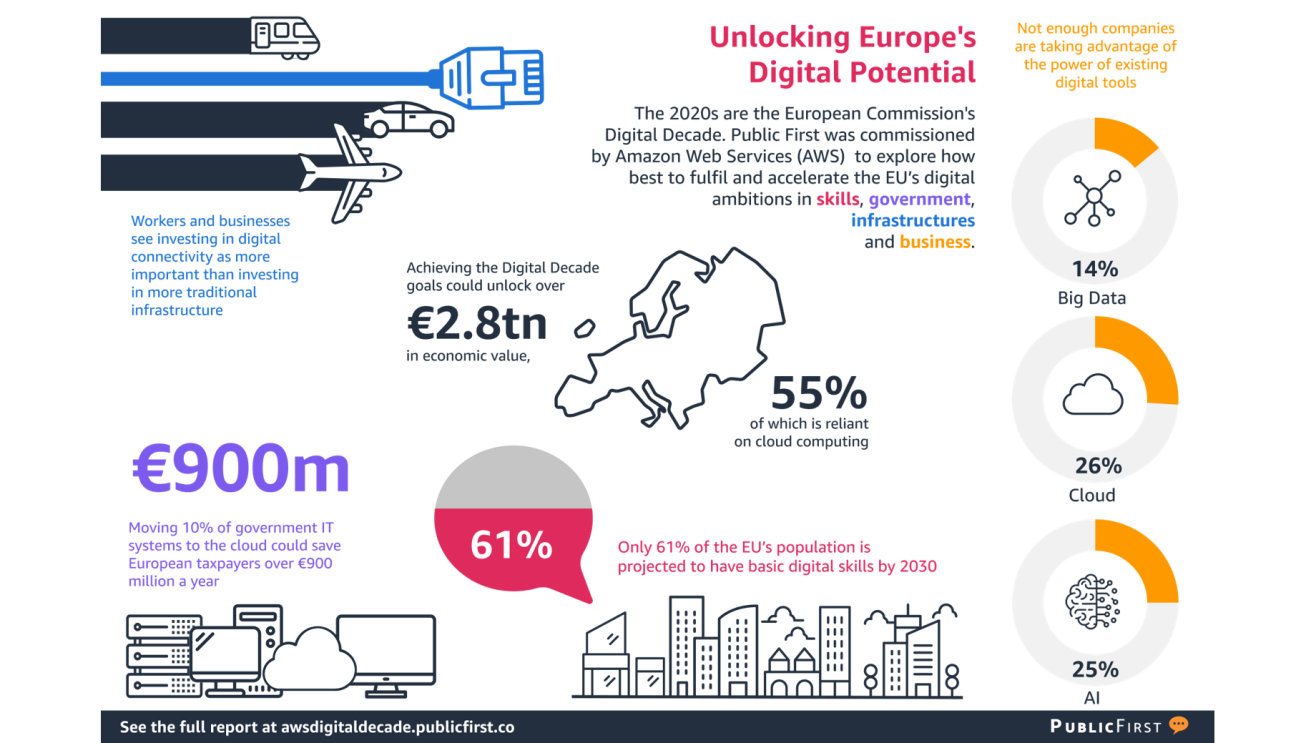In 2021, the European Commission (EC) announced the “Path to the Digital Decade,” a vision for Europe's digital transformation by 2030, which is divided into four areas—skills, infrastructures, government, and business—with key metrics to challenge and monitor progress.
Amazon Web Services (AWS) shares the EC’s vision for Europe’s digital transformation, and we commissioned Public First to undertake the “Unlocking Europe’s Digital Potential” study to understand how we can work together to help Europe unlock its digital ambitions.
According to Public First’s report, the Digital Decade could unlock over 2.8 trillion euros in gross value added (GVA), the measure of the value of goods and services produced in the region’s economy, which is equivalent to nearly 21% of the European Union’s (EU) current economy. The study highlights that 55% of the estimated GVA gain depends on cloud computing. Cloud computing refers to the on-demand delivery of information technology (IT) resources on the internet. Instead of buying, owning, and maintaining data centers and servers, organizations can access computing power, storage, databases, and other services on the cloud on an as-needed basis. With cloud computing, AWS manages and maintains the technology infrastructure, achieving the highest levels of security, privacy, and resilience for businesses.
The potential 2.8 trillion euros in GVA comprises 1.3 trillion euros the EU is already on course to achieve plus a further 1.5 trillion euros if digital progress is accelerated. If progress isn’t accelerated, the EU will achieve only 45% of the potential GVA of the Digital Decade. At the current rate of progress, achieving the EU’s full digital target will take until 2040, an extra 10 years.

Unlocking this value requires private and public sectors to join forces to accelerate the uptake and adoption of digital skills and technologies, such as cloud technologies. AWS, with its cloud expertise and action to help 29 million people globally grow their technical skills with free cloud computing skills training by 2025, supports the EU’s ambitions.
The EU is making good progress towards some of its Digital Decade targets. For example, it’s on track to meet its aim of doubling the number of “unicorns,” privately held startups valued at over $1 billion, by 2030. The EU is also making progress towards digitizing 100% of core public services and is likely to meet its gigabit for everyone and 5G everywhere target for internet connectivity.
These successes must be replicated across all of the EU’s Digital Decade targets. Accelerating progress requires a collective focus across public and private sectors on digital adoption, skills development, infrastructure, entrepreneurship, and digital government.
Accelerating digital transformation
In 2021, the EU had over 200 unicorns, double the level in 2017, and the number is on track to double again by 2030. However, many European companies have not yet adopted existing technologies, including the cloud. Digitizing the overall economy would boost growth by 20%, which is 8.5 times the value of growing the EU’s tech sector. The report also estimates the following:
- Few European companies have adopted foundational technologies such as the cloud (26%), artificial intelligence (AI) (25%), and big data (14%).
- By using services based on the cloud, e.g., customer relationship management (CRM), companies can boost business productivity by 10–25%.
- If EU businesses accelerate their adoption of cloud, AI, and big data by 10%, they would add 370 billion euros in GVA to the EU economy, an amount larger than the EU’s financial services industry.
Many businesses surveyed were unaware of the benefits of digital technology. Governments can play a crucial role, particularly for small businesses, providing training and support to address this.
Closing the skills gap
While a majority of Europeans possess basic digital skills, significant differences remain between countries, with the proportion of the population achieving at least basic digital skills ranging from 29% to 79%. Improving basic digital skills and increasing the number of women in information and communication technology (ICT) roles has been slow during the past five years. At this pace, the EC’s goal of 80% to achieve basic digital skills is unlikely to be met—only 61% of the EU’s population will have basic digital skills by 2030. Other key skills data presented in the report include the following:
- The digital skills shortage is impeding the development of more digitally advanced companies—79% of businesses view digital skills as important or essential, rising to 93% among “digitally intensive” businesses (businesses using a high level of digital technology, such as employees’ business internet use, number of ICT specialists, or online customer interactions).
- Among digitally intensive businesses, the digital shortage has slowed growth (40% of businesses), increased costs (33%), and slowed new technology development (35%).
- Meeting the EU’s target of 20 million ICT specialists by 2030 will be challenging without improving the inclusion of women ICT specialists. Based on current trends, less than 25% of ICT specialists will be women in 2030.

Much of the economic impact of the Digital Decade agenda will come from using technologies such as machine learning to automate existing tasks. This is likely to accelerate the need for the private and public sectors to support reskilling and upskilling existing workers, as job descriptions shift. AWS will continue to help economies address the digital and cloud skills shortage through education, training, and support through a range of schemes.
Accessing infrastructure without limitations and supporting sustainability
While the EU is on track to meet its connectivity targets, with 59% of households covered by fixed Very High Capacity Networks (VHCN), more will be needed to support the development of technologies such as edge computing, which enables data computing and storage closer to the data source. Alongside digital transformation, the other important structural change facing EU economies in the 2020s will be the transition to a decarbonized economy. Greater use of digital technology will play an essential role in supporting this change to advance sustainability.
Infrastructure and sustainability findings in the report include the following key points:
- Over 40% of consumers and over 50% of businesses chose faster, more reliable internet as their leading priority, compared with better roads, railways, and airports.
- Among European businesses, 89% agreed that the importance of sustainability would be maintained or grow as a factor in business decisions. Yet 44% of businesses, particularly SMEs, are not confident that they have adequate digital tools to monitor and improve sustainability.
- Having access to the best technology matters more than a cloud provider’s nationality; nationality was judged the least important factor in choosing a cloud provider. Technologies like the cloud deliver many digital products and services. To develop world-leading services, EU companies must be able to choose technology without restrictions that could limit their ability to grow, innovate, and compete.
Digitizing public services
The EU has achieved around 75% of its target of 100% of key digital public services and 84% of the same target for digital services for businesses. The EU is a digital world leader among governments. Some key indicators from the report include the following:
- Approximately 64% of EU citizens use digital government services, and 66% said they access information and services through government websites or apps.
- Many EU citizens feel comfortable using more digital government services—35% have accessed medical records or identification online, 55% said they would be comfortable accessing their medical records, and 46% felt comfortable proving their identity online, suggesting further uptake potential.
- Public First estimates that moving 10% of government IT systems to the cloud could save EU taxpayers over 900 million euros a year.
Public First found there was high willingness among EU citizens to use digital public services. Progress relies on learning from existing leaders. The EU should act as a facilitator between member states to help them learn from each other to replicate best practices for digital transformation, including how to standardize data and automate routine transactions.

Supporting Europe’s Digital Decade with AWS
AWS is committed to playing our part in empowering the Digital Decade and supporting Europe as the EU leads the way towards a digital and sustainable future. We use an ongoing and multi-tiered approach to support Europe’s digital transformation by focusing on the following:
- Earning trust. Europe is leading the way in a new industrial revolution towards a sustainable and digital future. We will continue to help customers meet evolving European laws and standards, and achieve the highest levels of security, privacy and resilience. We will work every day to earn trust as a partner in this transformation.
- Investing in skills. The next generation of leaders in Europe will need to work differently to succeed in a digital future. We will continue to help economies address the digital and cloud skills shortage through education, training, and support through a range of schemes. We will play our part in building the innovative skills European citizens and businesses need to compete—and succeed—on the world stage.
- Accelerating sustainability. A digital future for Europe is a sustainable future. We are on course to power our operations with 100% renewable energy by 2025, five years ahead of our original target of 2030. We are working alongside customers on new ideas that harness the potential of emergent technologies to help reduce carbon emissions and protect our environment. As the world’s largest buyer of renewable energy, we will continue to transform our infrastructure to meet our sustainability targets.
- Powering business. European companies need access to the world’s best technologies if they’re to be competitive at home and globally. To achieve their digital ambitions, AWS’s European customers should have the right to freely choose the technologies they need. AWS respects European values and will support the evolving regulatory landscape to help customers comply with current and future European legislation.
- Enabling innovation. Innovation is the lifeblood of the digital economy. We will continue to reduce the cost of innovation, allowing for rapid iteration, rollout, and scaling, by providing inventors and builders the ability to use high-powered computing without the expense and limitation of buying and running their own servers. We will help the best and brightest tackle Europe’s most pressing challenges.
Learn more about how cloud computing can support the EU’s Digital Decade.












